Lander & Rodgers, a prominent Australian law firm, has recently made significant strides in adopting cutting-edge technology to revolutionize its legal operations. By automating several legal tasks and launching an AI Lab, the firm is bolstering efficiency, enhancing accuracy, and driving innovation in the legal industry.
One of the most notable advancements is the implementation of Microsoft Copilot, an AI-powered assistant that supports staff in various legal functions. From contract drafting and review to legal research and reasoning, Copilot streamlines processes, enabling faster and more accurate outcomes. Additionally, it aids staff in simpler tasks like email composition and meeting summarization, fostering seamless communication and collaboration.
With hundreds of users already benefiting from Copilot, initial feedback from Lander & Rodgers indicates increased intuitiveness and significant time savings. The integration of Copilot extends beyond traditional legal functions, as it empowers non-lawyers in the business services group to generate compelling written and visual content for email newsletters and marketing materials.
Prior to deploying Copilot, Lander & Rodgers conducted thorough assessments to identify legal tasks that could be streamlined through automation. In collaboration with Monash University law lecturer Dr Jacqueline Weinberg, the firm’s innovation function, iHub, worked with students to test AI models and develop use cases over a five-month placement. This partnership enabled the firm to gain valuable insights into the potential of AI in legal practice.
In a bold move towards further innovation, Lander & Rodgers recently unveiled its AI Lab. Under the leadership of iHub, the lab brings together members of the technology group, select partners, and engaged lawyers to spearhead the development of specialized tools for legal tasks. The lab’s primary focus is on creating customized proofs-of-concept that bridge the gap between theoretical AI capabilities and practical, usable tools in legal practice.
Beyond tool development, the AI Lab aims to integrate AI into operational frameworks and legal workflows to optimize efficiency, accuracy, and client satisfaction. By leveraging AI, Lander & Rodgers intends to enhance decision-making capabilities and overall effectiveness while recognizing and addressing ethical considerations.
As the legal landscape continues to evolve, Lander & Rodgers remains at the forefront of leveraging AI to unlock untapped potential, drive innovation, and deliver superior legal services to its clients. Through embracing technology and combining it with legal expertise, the firm paves the way for a more efficient and forward-thinking legal practice.
An FAQ based on the article:
1. What steps has Lander & Rodgers taken to revolutionize its legal operations?
Lander & Rodgers has adopted cutting-edge technology and automated several legal tasks. They have also launched an AI Lab to drive innovation in the legal industry.
2. What is Microsoft Copilot and how does it support staff?
Microsoft Copilot is an AI-powered assistant that supports staff in various legal functions. It streamlines processes such as contract drafting, legal research, email composition, and meeting summarization, enabling faster and more accurate outcomes.
3. How has Copilot benefited Lander & Rodgers so far?
Initial feedback indicates increased intuitiveness and significant time savings for users of Copilot. It has also empowered non-lawyers in the business services group to generate compelling written and visual content.
4. How did Lander & Rodgers identify legal tasks that could be streamlined through automation?
Prior to deploying Copilot, Lander & Rodgers conducted thorough assessments. They worked with students from Monash University to test AI models and develop use cases over a five-month placement, gaining valuable insights into the potential of AI in legal practice.
5. What is the purpose of Lander & Rodgers’ AI Lab?
The AI Lab, led by the firm’s innovation function, iHub, aims to develop specialized tools for legal tasks. Its focus is on creating proofs-of-concept that bridge the gap between theoretical AI capabilities and practical, usable tools in legal practice.
6. How does Lander & Rodgers intend to leverage AI for operational frameworks and legal workflows?
The firm aims to integrate AI into operational frameworks and legal workflows to optimize efficiency, accuracy, and client satisfaction. By leveraging AI, they hope to enhance decision-making capabilities while recognizing and addressing ethical considerations.
Definitions for key terms and jargon used in the article:
– AI: Artificial Intelligence refers to the simulation of human intelligence in machines that are programmed to think and learn like humans.
– Automation: The use of technology to perform tasks or processes with minimal human intervention.
– AI-powered assistant: An assistant or software that uses Artificial Intelligence algorithms and capabilities to support and enhance various tasks and functions.
– Legal research: The process of finding legal information and authorities that can be used to support legal arguments and decisions.
– Use cases: Practical examples or scenarios demonstrating how a particular technology or system can be utilized to solve real-world problems.
– Proofs-of-concept: Demonstrations or prototypes that show the feasibility and potential of a proposed technology or solution.
– Operational frameworks: Structures and processes put in place to guide and manage the operations of an organization or department.
– Legal workflows: The sequence of steps and processes involved in handling legal matters, from initiation to completion.
Suggested related links:
– Lander & Rodgers official website
The source of the article is from the blog shakirabrasil.info

